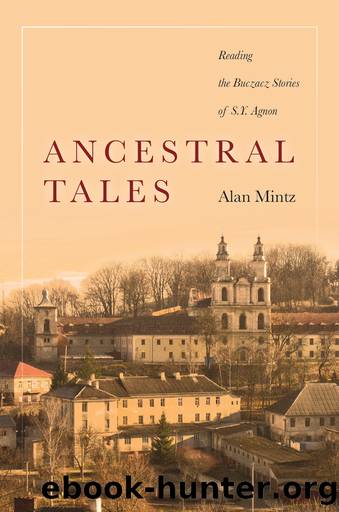Ancestral Tales by Alan Mintz

Author:Alan Mintz [Mintz, Alan]
Language: eng
Format: epub
Publisher: Stanford University Press
Published: 2017-06-15T00:00:00+00:00
6
Austrian Mandates
The half million Jews that Austria received upon the first partition of Poland in 1772 was an equivocal gift. The number of Jews in the empire doubled and presented Vienna with the sudden challenge of governing the populous new province of Galicia. Without the benefit of accurate or substantial demographic and economic data about the region, Maria Theresa and Joseph II did not hesitate to issue a raft of legislation aimed at bringing the Jews within the orbit of enlightened absolutism. What ensued in the following decades was a jittery dance between an incessant imperial desire to reshape Galician Jewry and a resourceful determination to resist that control. Agnon sets several of the major stories in A City in Its Fullness within the turmoil caused by the Theresian-Josephine reforms, and these stories contain a surprise. Rather than allowing his Hebrew reader to settle comfortably into an opposition between gentile malevolence and Jewish resistance, Agnon subverts this binary and presents the new regime as merely an external pressure that reveals deep moral fissures within the Jewish community. Yes, the news is grim, these stories imply, but the source of the evil is closer to home.
The disorientation occasioned by the accession of Galicia was even greater for the Jews than it was for the Austrians. The Jews had lived for centuries within the Polish-Lithuanian Commonwealth as a kind of fifth estate with a degree of judicial and communal authority. Some Jews lived on Crown lands, and others, like the Jews of Buczacz, lived in towns wholly owned and governed by wealthy nobles. Jews might be despised by their Polish overlords, but as a corporate entity they were often granted privileges on par with the Christian town dwellers. A willful seigneur could intervene in internal communal affairs and rabbinic appointments, as we have seen in several stories; yet commercial conflicts and acts of deviance and criminality were generally adjudicated in rabbinic courts. Persecutions occurred, of course, and Jews enjoyed few legal protections because the lord of the manor was the law; the lessee of a tavern or a mill who failed to produce enough income could be thrown into a stockade at the will of the master. But these eruptions of crueltyâgezeirot (gezeirah, singular) in Jewish parlanceâwere not the everyday norm, and they could usually be mitigated by bribes or ransoms. Compared with what was to come, moreover, these troubles had the advantage of being neither ideological nor bureaucratic. For better or worse, they represented a true picture of the irrational feelings of two groups living in close contact.
The lives of Galician Jews changed dramatically as an immediate consequence of a geopolitical development in which they had no role. (The Polish nobility and the Ruthenian peasantry were also profoundly affected.) Upon the Jews of Galicia, writes Stanislav Gordziski,
fell an avalanche of rules that changed their legal status, limited their autonomy, raised their taxes dramatically, imposed military service, and interfered deeply even in the sphere of private life. In contrast to the much
Download
This site does not store any files on its server. We only index and link to content provided by other sites. Please contact the content providers to delete copyright contents if any and email us, we'll remove relevant links or contents immediately.
4 3 2 1: A Novel by Paul Auster(12393)
The handmaid's tale by Margaret Atwood(7767)
Giovanni's Room by James Baldwin(7347)
Big Magic: Creative Living Beyond Fear by Elizabeth Gilbert(5775)
Asking the Right Questions: A Guide to Critical Thinking by M. Neil Browne & Stuart M. Keeley(5775)
Ego Is the Enemy by Ryan Holiday(5450)
The Body: A Guide for Occupants by Bill Bryson(5098)
On Writing A Memoir of the Craft by Stephen King(4945)
Ken Follett - World without end by Ken Follett(4734)
Adulting by Kelly Williams Brown(4576)
Bluets by Maggie Nelson(4559)
Eat That Frog! by Brian Tracy(4542)
Guilty Pleasures by Laurell K Hamilton(4450)
The Poetry of Pablo Neruda by Pablo Neruda(4110)
Alive: The Story of the Andes Survivors by Piers Paul Read(4033)
White Noise - A Novel by Don DeLillo(4012)
Fingerprints of the Gods by Graham Hancock(4005)
The Book of Joy by Dalai Lama(3986)
The Bookshop by Penelope Fitzgerald(3854)
